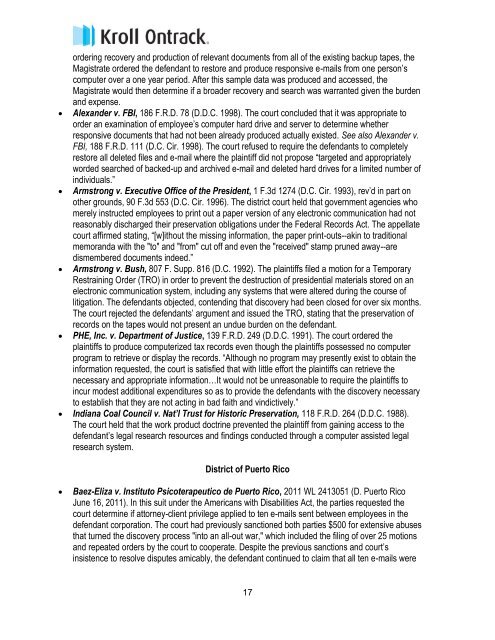Electronic Discovery and Computer Forensics Case List - Kroll Ontrack
Electronic Discovery and Computer Forensics Case List - Kroll Ontrack
Electronic Discovery and Computer Forensics Case List - Kroll Ontrack
Create successful ePaper yourself
Turn your PDF publications into a flip-book with our unique Google optimized e-Paper software.
ordering recovery <strong>and</strong> production of relevant documents from all of the existing backup tapes, the<br />
Magistrate ordered the defendant to restore <strong>and</strong> produce responsive e-mails from one person’s<br />
computer over a one year period. After this sample data was produced <strong>and</strong> accessed, the<br />
Magistrate would then determine if a broader recovery <strong>and</strong> search was warranted given the burden<br />
<strong>and</strong> expense.<br />
� Alex<strong>and</strong>er v. FBI, 186 F.R.D. 78 (D.D.C. 1998). The court concluded that it was appropriate to<br />
order an examination of employee’s computer hard drive <strong>and</strong> server to determine whether<br />
responsive documents that had not been already produced actually existed. See also Alex<strong>and</strong>er v.<br />
FBI, 188 F.R.D. 111 (D.C. Cir. 1998). The court refused to require the defendants to completely<br />
restore all deleted files <strong>and</strong> e-mail where the plaintiff did not propose “targeted <strong>and</strong> appropriately<br />
worded searched of backed-up <strong>and</strong> archived e-mail <strong>and</strong> deleted hard drives for a limited number of<br />
individuals.”<br />
� Armstrong v. Executive Office of the President, 1 F.3d 1274 (D.C. Cir. 1993), rev’d in part on<br />
other grounds, 90 F.3d 553 (D.C. Cir. 1996). The district court held that government agencies who<br />
merely instructed employees to print out a paper version of any electronic communication had not<br />
reasonably discharged their preservation obligations under the Federal Records Act. The appellate<br />
court affirmed stating, “[w]ithout the missing information, the paper print-outs--akin to traditional<br />
memor<strong>and</strong>a with the "to" <strong>and</strong> "from" cut off <strong>and</strong> even the "received" stamp pruned away--are<br />
dismembered documents indeed.”<br />
� Armstrong v. Bush, 807 F. Supp. 816 (D.C. 1992). The plaintiffs filed a motion for a Temporary<br />
Restraining Order (TRO) in order to prevent the destruction of presidential materials stored on an<br />
electronic communication system, including any systems that were altered during the course of<br />
litigation. The defendants objected, contending that discovery had been closed for over six months.<br />
The court rejected the defendants’ argument <strong>and</strong> issued the TRO, stating that the preservation of<br />
records on the tapes would not present an undue burden on the defendant.<br />
� PHE, Inc. v. Department of Justice, 139 F.R.D. 249 (D.D.C. 1991). The court ordered the<br />
plaintiffs to produce computerized tax records even though the plaintiffs possessed no computer<br />
program to retrieve or display the records. “Although no program may presently exist to obtain the<br />
information requested, the court is satisfied that with little effort the plaintiffs can retrieve the<br />
necessary <strong>and</strong> appropriate information…It would not be unreasonable to require the plaintiffs to<br />
incur modest additional expenditures so as to provide the defendants with the discovery necessary<br />
to establish that they are not acting in bad faith <strong>and</strong> vindictively.”<br />
� Indiana Coal Council v. Nat’l Trust for Historic Preservation, 118 F.R.D. 264 (D.D.C. 1988).<br />
The court held that the work product doctrine prevented the plaintiff from gaining access to the<br />
defendant’s legal research resources <strong>and</strong> findings conducted through a computer assisted legal<br />
research system.<br />
District of Puerto Rico<br />
� Baez-Eliza v. Instituto Psicoterapeutico de Puerto Rico, 2011 WL 2413051 (D. Puerto Rico<br />
June 16, 2011). In this suit under the Americans with Disabilities Act, the parties requested the<br />
court determine if attorney-client privilege applied to ten e-mails sent between employees in the<br />
defendant corporation. The court had previously sanctioned both parties $500 for extensive abuses<br />
that turned the discovery process "into an all-out war," which included the filing of over 25 motions<br />
<strong>and</strong> repeated orders by the court to cooperate. Despite the previous sanctions <strong>and</strong> court’s<br />
insistence to resolve disputes amicably, the defendant continued to claim that all ten e-mails were<br />
17

















